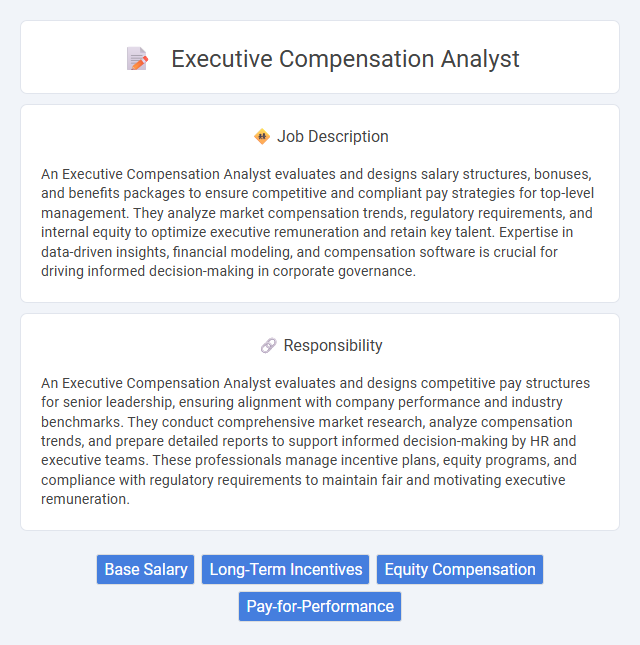
An Executive Compensation Analyst evaluates and designs salary structures, bonuses, and benefits packages to ensure competitive and compliant pay strategies for top-level management. They analyze market compensation trends, regulatory requirements, and internal equity to optimize executive remuneration and retain key talent. Expertise in data-driven insights, financial modeling, and compensation software is crucial for driving informed decision-making in corporate governance.
Individuals with strong analytical skills and a keen interest in corporate finance and human resources will likely thrive as executive compensation analysts. Those comfortable working with complex data sets and interpreting compensation trends in executive pay structures may find this role fitting and rewarding. Candidates lacking attention to detail or an understanding of regulatory compliance might face challenges in fulfilling the job requirements effectively.
Qualification
An Executive Compensation Analyst must possess a strong background in finance, accounting, or human resources, often requiring a bachelor's degree in these fields, with many roles preferring candidates holding advanced certifications such as Certified Compensation Professional (CCP) or Certified Employee Benefit Specialist (CEBS). Expertise in financial modeling, data analysis, and regulatory compliance related to executive pay structures is critical, alongside proficiency in software tools like Excel, SQL, and compensation management systems. Strong analytical skills, attention to detail, and knowledge of market trends and governance frameworks enable accurate benchmarking and design of competitive executive compensation packages.
Responsibility
An Executive Compensation Analyst evaluates and designs competitive pay structures for senior leadership, ensuring alignment with company performance and industry benchmarks. They conduct comprehensive market research, analyze compensation trends, and prepare detailed reports to support informed decision-making by HR and executive teams. These professionals manage incentive plans, equity programs, and compliance with regulatory requirements to maintain fair and motivating executive remuneration.
Benefit
An Executive Compensation Analyst likely benefits from a role that offers competitive salaries and performance-based bonuses due to the strategic nature of their work. They may also gain access to extensive professional development opportunities and networking within high-level corporate environments. This position probably provides valuable insight into corporate governance and compensation trends, enhancing career growth potential.
Challenge
The role of an executive compensation analyst likely demands navigating complex regulatory environments while balancing competitive pay structures to attract top leadership talent. Managing data accuracy and market trends could pose ongoing challenges in providing strategic compensation recommendations. Strict compliance requirements and evolving corporate governance standards may increase the difficulty of designing equitable and motivating executive compensation packages.
Career Advancement
Executive compensation analysts specializing in market trends and pay structures enhance their career advancement by mastering data analysis, financial modeling, and regulatory compliance. Progression opportunities include senior analyst roles, compensation consultant positions, and leadership in human resources strategy teams within Fortune 500 companies. Expertise in executive pay benchmarking and incentive plans significantly boosts prospects for promotion and influence in organizational decision-making.
Key Terms
Base Salary
Executive compensation analysts typically earn a base salary ranging from $70,000 to $120,000 annually, depending on experience, industry, and company size. This fixed income forms the core financial component of their total remuneration, supplemented by bonuses and incentives linked to company performance. Salaries tend to be higher in major financial hubs such as New York, San Francisco, or London, reflecting the cost of living and sector demand.
Long-Term Incentives
Executive compensation analysts specializing in long-term incentives design and evaluate equity-based reward programs such as stock options, restricted stock units (RSUs), and performance shares to align executive goals with shareholder value. They analyze market trends, benchmarking data, and regulatory requirements to recommend competitive and compliant incentive structures that drive sustained company performance. Expertise in modeling deferred compensation and assessing vesting schedules ensures optimal retention and motivation of top executives.
Equity Compensation
An Executive Compensation Analyst specializing in equity compensation evaluates stock-based incentives such as stock options, restricted stock units (RSUs), and performance shares to align executive rewards with company performance and shareholder value. This role involves detailed benchmarking against industry standards, regulatory compliance with SEC and IRS guidelines, and financial modeling to forecast the impact of equity grants on company financials. Proficiency in compensation software and knowledge of tax implications enhances the strategic design of equity plans that attract and retain top executive talent.
Pay-for-Performance
Executive compensation analysts specializing in pay-for-performance design and evaluate incentive plans that align executive rewards with company financial and operational goals. They utilize benchmarking data and financial metrics to ensure executive pay packages motivate sustained shareholder value creation. Proficiency in regulatory compliance and market trends supports effective analysis of compensation structures tied to performance outcomes.
 kuljobs.com
kuljobs.com